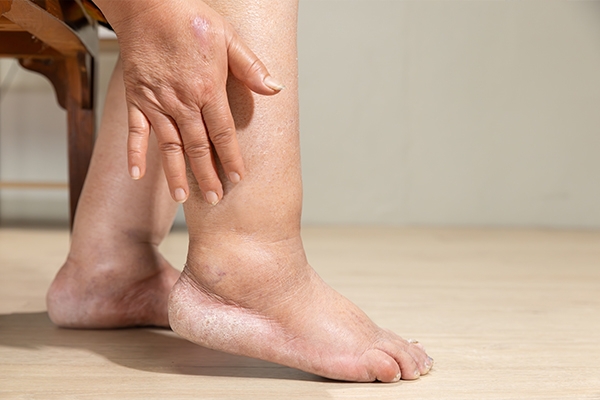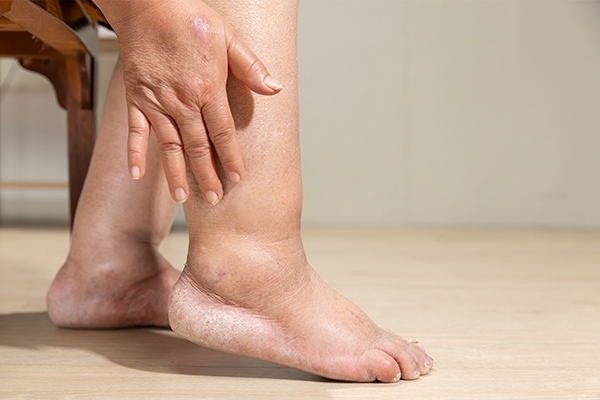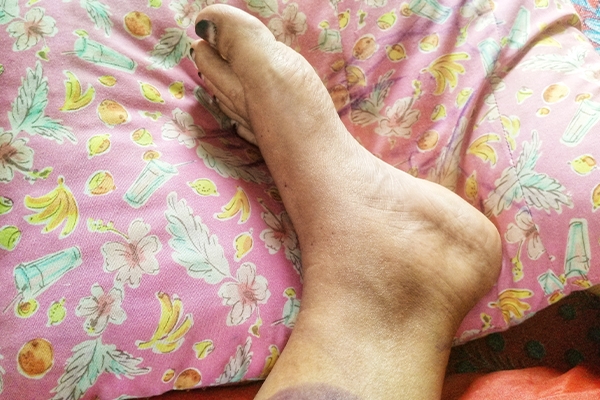Swollen Feet: Don't Take It Lightly

Anyone can experience swollen feet once in a while, such as after walking or standing for too long. Usually, this is not dangerous and can go away on its own. However, in some cases, swollen feet can indicate a more serious health problem.
What causes swollen feet?

Swollen feet (peripheral edema) occur when fluid builds up in the tissues of the feet and ankles.
Some common causes are:
- Physical activity: standing or walking for a long time.
- High-salt foods trigger fluid retention in the body.
- Obesity increases pressure on the leg veins.
- Pregnancy: hormonal changes and uterine pressure on the blood vessels.
- Certain medications, including blood pressure medications, birth control pills, hormone therapy, steroids, and antidepressants.
- Long journeys: sitting in a still position for too long, for example, on a flight or in a car.
In women, swelling can also occur during the menstrual cycle or when they take the hormone estrogen. Meanwhile, severe swelling during pregnancy may indicate preeclampsia, a serious condition involving high blood pressure that must be treated immediately.
Symptoms of swollen feet

- Swelling in the ankles, feet, or legs.
- Skin feels tight, shiny or looks stretched.
- Heavy or stiff feeling.
- Changes in skin color.
- Dents when the skin is pressed (pitting edema).
- Pain in some cases.
How to deal with swollen feet

Normal, swollen feet can go away on their own. You can also do the following to deal with it yourself:
- Raise when sitting or lying down; use pillows for support.
- Do light exercise, such as walking, to improve blood circulation.
- Wear comfortable and loose footwear.
- Keep your feet clean and your skin moist to prevent infection.
- Avoid sitting for too long when traveling. Try to stand up and move regularly.
- Maintain the ideal body weight.
However, if the edema does not disappear, appears suddenly, or only occurs in one leg, you should see a doctor immediately.
Warning signs behind swollen legs
Here are some medical conditions that can cause swollen legs:
1. Venous insufficiency
The valves in the veins of our legs prevent blood from being pulled down by gravity and pooling in the leg veins. As we age, these valves can weaken. As a result, blood pools in the legs, causing chronic swelling.
2. Phlebitis
Inflamed superficial veins in the legs or soles of the feet can cause pain and swelling.
3. Deep Vein Thrombosis (DVT)
Sitting for too long without moving—such as during long commutes or working at a computer—can cause blood flow to slow and pool in the legs.
This can cause blood clots to form in the deep veins of the legs, known as deep vein thrombosis (DVT). DVT can also occur in patients on prolonged bed rest.
DVT is a dangerous condition because the blood clots that form can block blood flow from the legs to the heart. More dangerously, these clots can break off and move to the lungs, causing a pulmonary embolism, which can cause symptoms such as shortness of breath and chest pain when breathing and can even lead to death.
The most common symptom of DVT is swelling in one leg—usually only in the affected leg. This swelling may be accompanied by pain, warmth, and skin discoloration in the affected area.
4. Heart failure
Heart failure occurs when the ventricles (the heart's lower chambers) become weak or stiff and cannot pump blood effectively.
As a result, blood that should be returning to the heart accumulates in the veins of the legs. This buildup causes fluid to leak from the veins into the tissues, leading to swelling in the feet and lower legs.
5. Liver disease
Some liver diseases, such as cirrhosis, can reduce the production of albumin, a protein the liver makes that helps maintain blood osmotic pressure.
When albumin levels in the blood are low, fluid can more easily leak from the blood vessels into the body's tissues. This causes swelling in the feet and legs and other parts of the body, including the hands, face, or abdomen (ascites).
6. Kidney disease
The kidneys play an essential role in regulating the body's fluid balance by filtering the blood and removing excess fluid through urine. When kidney function fails, the body has difficulties eliminating extra salt and water, which subsequently accumulates in the tissue and produces swelling -- especially in the feet.
Swelling from kidney failure is usually quite severe and is accompanied by other symptoms, such as fatigue, decreased urination, or increased blood pressure.
7. Infection
Cellulitis is a common bacterial skin infection that causes redness, swelling, and pain in the infected area. Cellulitis can appear anywhere on the body but is most common on the feet and legs. If left untreated, cellulitis can spread and cause serious health problems.
When to see a doctor?
Seek immediate medical attention if you experience:
- sudden swelling in only one leg;
- pain, redness, or warmth to the touch;
- shortness of breath, chest pain, or irregular heartbeat;
- swelling that doesn't go away with elevation or rest.
Swollen legs can signify various conditions, ranging from mild to serious. You can prevent complications and maintain your overall health by noticing symptoms early.
Don't hesitate to consult a doctor at GWS Medika Clinic, health clinic in Jakarta, if you notice any suspicious signs.
Get the right solution for skin care and wound cleansing with wund+™ GWS Wellness.
These products help address various skin concerns, such as dry skin, wounds, or infections.
About GWS Medika
GWS Medika now has seven clinics strategically positioned around Jakarta, consisting of five primary clinics and two medical centers in Blok M and Permata Hijau.
These two medical centers provide comprehensive health services, from general practitioner consultations to specialists in cardiology, radiology, and dentistry.
Supported by modern facilities, GWS Medika provides various diagnostic services, including heart examinations with treadmills, USG, X-rays, and dental panoramic X-rays.
GWS Medika also provides vaccinations and medical check-ups (MCU) for individuals and companies, IV treatment, home service, and office visits throughout our clinic network.
Skin and aesthetic health services are available, especially at the GWS Medika Blok M Medical Center.
GWS Medika, a health clinic in Jakarta, is committed to providing comfortable, reliable, and easily accessible health services, both at the clinic and directly to your location.



